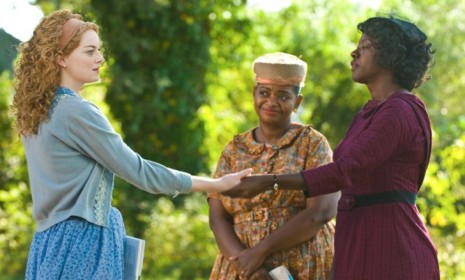The Help's 'Disneyfied version of the Jim Crow South'
Can a slick Hollywood dramedy really do justice to the volatile Civil Rights era?

A free daily email with the biggest news stories of the day – and the best features from TheWeek.com
You are now subscribed
Your newsletter sign-up was successful
Hitting theaters today is The Help, a movie based on Kathryn Stockett’s bestselling novel about white women and their African-American servants in early 1960s Mississippi — and critics are debating whether the film's portrayal of racial tensions and violence at the dawn of the Civil Rights era rings true. Is The Help, as one commentator put it, little more than a "Disneyfied version of the Jim Crow South"? (Watch a trailer for the movie.)
It's too Hollywood: Despite its noble intentions, The Help suffers from an often unavoidable byproduct of Hollywood-ization, says Glenn Kenny at MSN. It patronizes its audience, serving up "one entertaining diversion or other whenever its story line threatens to turn a corner into the valley of The Real." The movie tries to "confront the ugly truth of our nation's history with both a clear eye and some genuine compassion," and succeeds on occasion (for instance, when civil rights activist Medgar Evans is killed), but too often it's mired in soapy subplots.
"The Help has trouble getting real"
The Week
Escape your echo chamber. Get the facts behind the news, plus analysis from multiple perspectives.

Sign up for The Week's Free Newsletters
From our morning news briefing to a weekly Good News Newsletter, get the best of The Week delivered directly to your inbox.
From our morning news briefing to a weekly Good News Newsletter, get the best of The Week delivered directly to your inbox.
It glosses over the violence of the time: The Help would seem to have "us believe that the racism of the time was the stuff of bridge clubs," says Wesley Morris in the Boston Globe. We meet a number of bigoted white women, but their husbands are typically absent. Who knows what these men are up to off-screen with the stink of white supremacy in the air? Curiously, the most violent man in the film is an abusive black husband.
It's well done, but tailored to white people: The Help is "a stirring black-empowerment tale aimed squarely at white [audiences]," says Peter Debruge in Variety. It "personalizes the civil rights movement" and serves as a "deeply affecting exercise in empathy" for those who've never really pondered the black experience during that period. Sure, it "somewhat patronizingly seeks to understand" the black community and leaves out key details from the book, but, given the progress we've made as a country since the time, it optimistic ending can't be contested.
A free daily email with the biggest news stories of the day – and the best features from TheWeek.com
Viola Davis saves the film: The film is "at times bizarrely buoyant" given the subject matter, but Viola Davis, as the quiet maid Aibileen, injects it with a "gravity it frequently seems to want to shrug off," says Manohla Dargis in The New York Times. Davis makes Aibileen more dimensional than the book's depiction, and keeps the film focused on the black maids' struggles. Still, the novel's central conceit — "that the white characters, with their troubled relationships and unloved children, carry burdens equal to those of the black character" — ultimately remains problematic.
-
 6 of the world’s most accessible destinations
6 of the world’s most accessible destinationsThe Week Recommends Experience all of Berlin, Singapore and Sydney
-
 How the FCC’s ‘equal time’ rule works
How the FCC’s ‘equal time’ rule worksIn the Spotlight The law is at the heart of the Colbert-CBS conflict
-
 What is the endgame in the DHS shutdown?
What is the endgame in the DHS shutdown?Today’s Big Question Democrats want to rein in ICE’s immigration crackdown